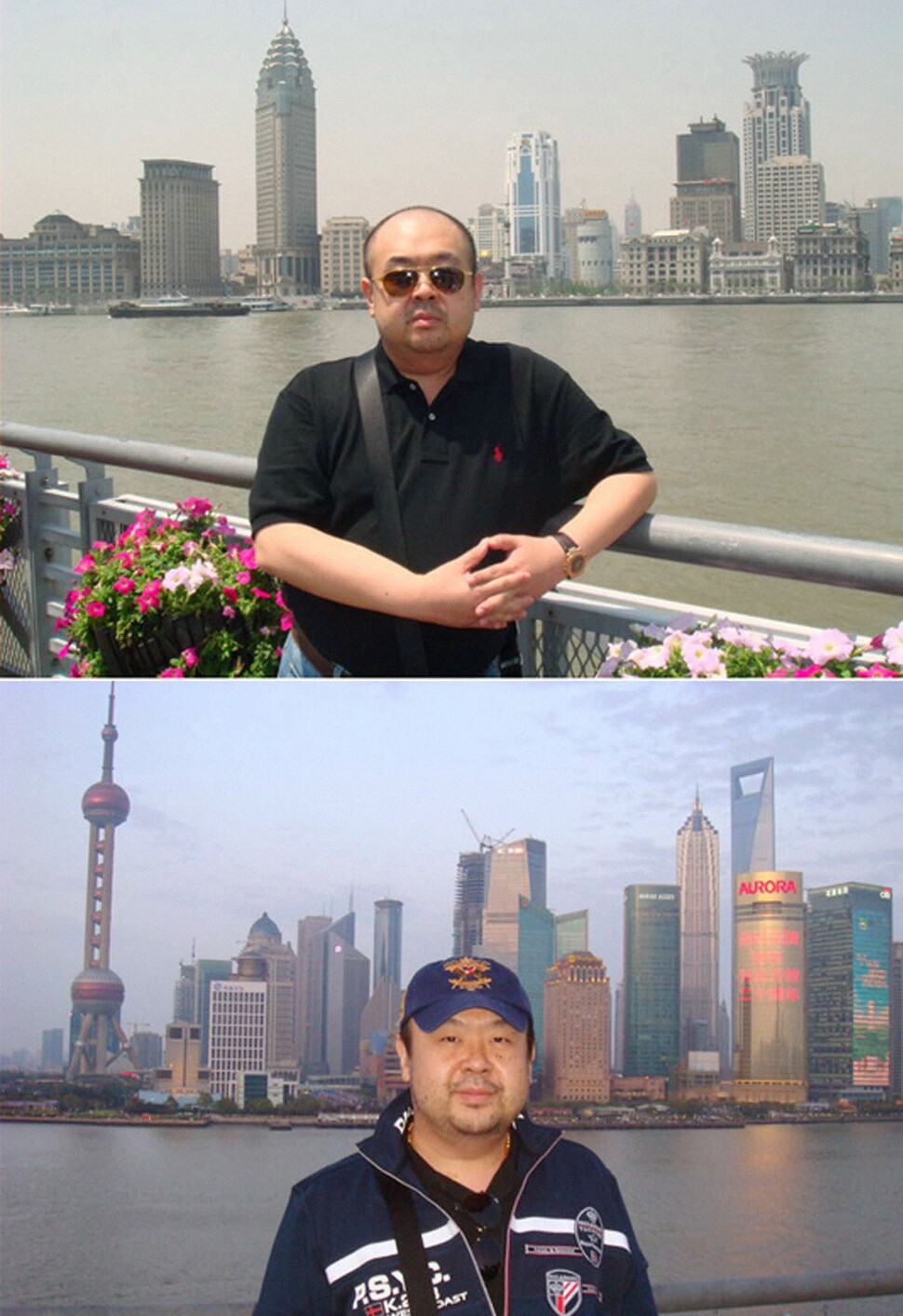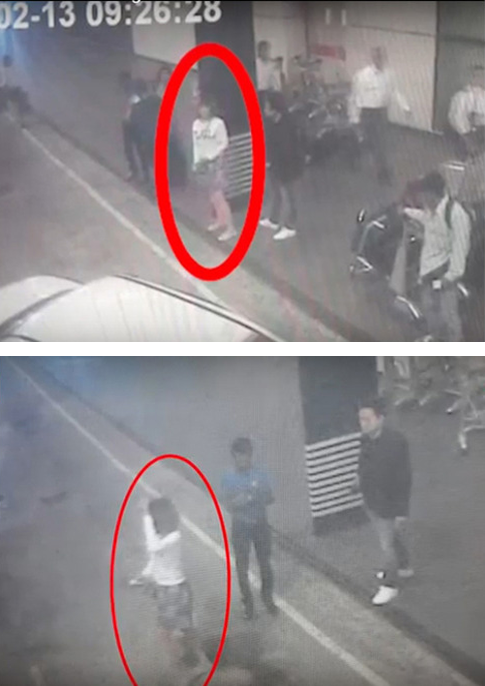hankyoreh
Links to other country sites 다른 나라 사이트 링크
Kim Jong-un’s half brother assassinated in Malaysia

Kim Jong-nam, 46, eldest son of former North Korean leader Kim Jong-il and half brother of current leader Kim Jong-un, was reportedly killed in Malaysia on the morning of Feb. 13.
The Ministry of Unification and National Intelligence confirmed that Kim Jong-nam was killed at 9 am on Feb. 13 by two women at the Kuala Lumpur airport who reportedly attacked him with poisoned spray. After Kim collapsed following the attack, he was taken to an airport clinic and then a hospital, but he eventually passed away.
The Malaysian police said that Kim, who was on his way to Macao, was carrying a fake passport under the name “Kim Chol,” and that his passport stated he was born in Pyongyang on June 10, 1970. The police are currently investigating Kim’s movements inside Malaysia and the people he met there, and they are tracking at least two female suspects. They are also planning a postmortem to determine cause of death. The North Korean embassy in Malaysia has reportedly requested Kim’s body be transferred to their possession, but the Malaysian government has delayed any decision until after the postmortem.

It‘s widely suspected that the North Korean authorities were involved in Kim Jong-nam’s assassination because Kim Jong-nam was once Kim Jong-un’s rival in the dynastic succession in North Korea. “Kim Jong-nam’s assassination could not have occurred without the direct approval or consent of Kim Jong-un. We‘ve concluded that North Korea’s Reconnaissance General Bureau, which had kept tabs on Kim Jong-nam, was directly involved,” said Cheong Seong-chang, Senior Research Fellow in the Department of Unification Strategy Studies the Sejong Institute.
Now in its fifth year, the regime of Kim Jong-un is considered stable enough to have held the 7th Party Congress (its first in 36 years) in May 2016 and to reorganize the party, but since last year it has been facing a domestic and international crisis because of various sanctions imposed for its development of nuclear weapons and missiles. This has prompted some to speculate that North Korea has a greater need to eliminate even the smallest of risk factors.
The first reason for speculating that Kim Jong-un had his half-brother killed is because Kim Jong-nam had criticized North Korea‘s dynastic succession. Until Kim Jong-il’s death in Dec. 2011, Kim Jong-nam had openly made critical remarks about the dynastic succession in North Korea.

Kim Jong-nam said he was “personally opposed to the handover of power to the third generation,” during an interview with Japan‘s Asahi TV on Oct. 11, 2010, and he made similar remarks in an interview with Japan’s Tokyo Shimbun in Jan. 2011. Furthermore, Kim Jong-nam had once been regarded as a leading candidate for succeeding his father. It was often noted that Kim Jong-nam was better known than his half-brother Kim Jong-un and that he had taken classes about succeeding to power from an early age.
The incident that ended Kim Jong-nam’s dynastic potential occurred in 2001. After subjecting North Korea to international humiliation by being caught trying to enter Japan with a fake passport, he lost his influence in the government. Since his removal from the line of succession, Kim Jong-nam has remained outside of North Korea, moving between Macao and places in China.
But in interviews with the press in which Kim Jong-un was mentioned as the successor, Kim Jong-nam adopted a cautious attitude. “I think that this was what my father decided. Since I’ve never had any regrets or interest in this, I don’t care at all,” he said. While Kim Jong-nam refrained from speaking to the outside world since Kim Jong-un came to power after Kim Jong-il’s death, he had occasional run-ins with the foreign press. Experts believed that he kept reminding the international community of his existence to defend himself from the threat of Kim Jong-un.
Another view is that Kim Jong-nam’s death is related to the deterioration of North Korea’s relations with China. Even though more than five years have passed since Kim Jong-un became North Korea’s supreme leader, he has still not had a summit with China. Since Kim Jong-un has not received official recognition from the Chinese government, some have said, his greatest fear was the possibility of China establishing a “puppet regime” under Kim Jong-nam. In the event of a crisis in North Korea, Kim Jong-nam was thought to be China’s likely choice, given his relative openness and flexible outlook. That is why experts agreed that China was providing Kim Jong-nam with protection in his travels overseas.
This is prompting speculation that Kim Jong-nam’s death is connected with the sudden execution of Jang Song-thaek, Kim Jong-un’s uncle, in Dec. 2013. Jang Song-thaek was one of the North Korean figures with the closest ties to China.
By Kim Jin-cheol, staff reporter
Please direct questions or comments to [english@hani.co.kr]

Editorial・opinion
![[Guest essay] The real reason Korea’s new right wants to dub Rhee a founding father [Guest essay] The real reason Korea’s new right wants to dub Rhee a founding father](https://flexible.img.hani.co.kr/flexible/normal/500/300/imgdb/original/2024/0423/8317138574257878.jpg) [Guest essay] The real reason Korea’s new right wants to dub Rhee a founding father
[Guest essay] The real reason Korea’s new right wants to dub Rhee a founding father![[Column] ‘Choson’: Is it time we start referring to N. Korea in its own terms? [Column] ‘Choson’: Is it time we start referring to N. Korea in its own terms?](https://flexible.img.hani.co.kr/flexible/normal/500/300/imgdb/original/2024/0423/3617138579390322.jpg) [Column] ‘Choson’: Is it time we start referring to N. Korea in its own terms?
[Column] ‘Choson’: Is it time we start referring to N. Korea in its own terms?- [Editorial] Japan’s rewriting of history with Korea has gone too far
- [Column] The president’s questionable capacity for dialogue
- [Column] Are chaebol firms just pizza pies for families to divvy up as they please?
- [Column] Has Korea, too, crossed the Rubicon on China?
- [Correspondent’s column] In Japan’s alliance with US, echoes of its past alliances with UK
- [Editorial] Does Yoon think the Korean public is wrong?
- [Editorial] As it bolsters its alliance with US, Japan must be accountable for past
- [Guest essay] Amending the Constitution is Yoon’s key to leaving office in public’s good graces
Most viewed articles
- 1[Column] ‘Choson’: Is it time we start referring to N. Korea in its own terms?
- 2Senior doctors cut hours, prepare to resign as government refuses to scrap medical reform plan
- 3[Guest essay] The real reason Korea’s new right wants to dub Rhee a founding father
- 4Why Korea shouldn’t welcome Japan’s newly beefed up defense cooperation with US
- 5Opposition calls Yoon’s chief of staff appointment a ‘slap in the face’
- 6New AI-based translation tools make their way into everyday life in Korea
- 7Terry Anderson, AP reporter who informed world of massacre in Gwangju, dies at 76
- 8[Column] The clock is ticking for Korea’s first lady
- 9Samsung barricades office as unionized workers strike for better conditions
- 10Korean government’s compromise plan for medical reform swiftly rejected by doctors